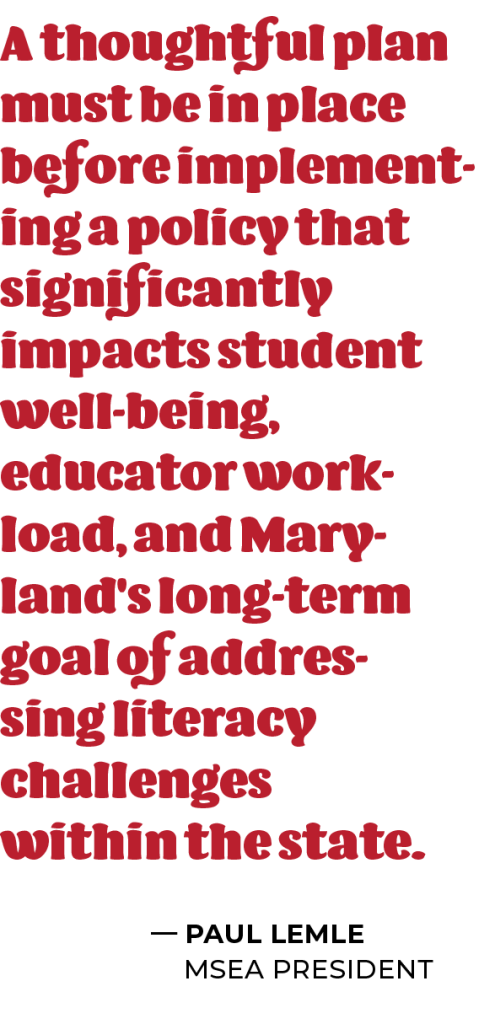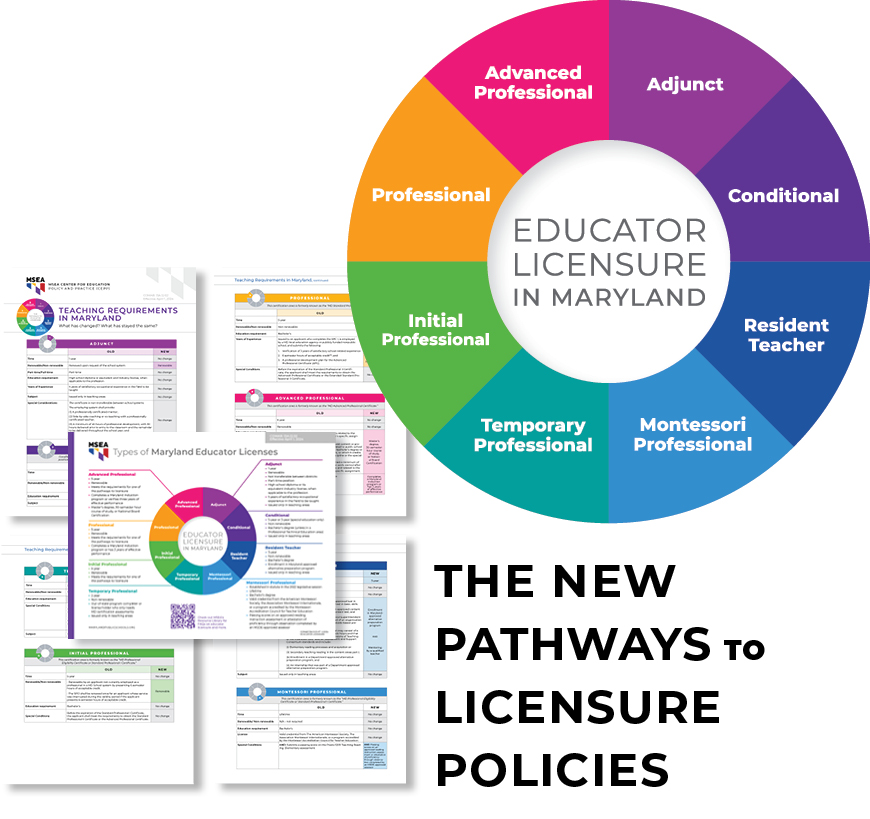Equity, Workload, Educator Shortage
Educators and the New Literacy Policy


Of major concern in the policy proposal was retention and its impact on equity, workload, and capacity. Retaining third grade students who do not read at grade level, which is one of the aspects of the policy, has the potential to exacerbate issues of workload and staffing, and retention frequently has long-term negative impacts on students. We know the social and emotional impact retention policies can have on students and the fact that retention alone does not ensure students will obtain reading proficiency. The data is clear that retention policies often disproportionately impact students of color — Black, Latinx, and Native — and English language learners. These students have historically been under-served by our schools and further disengagement from their studies and school can lead to increased behavioral challenges.
“I am keenly aware of the urgency of creating such a policy. As we enter into year four of the implementation of the Blueprint for Maryland’s Future, many of its promises are just beginning to materialize. These are necessary investments that should be fully developed before contemplating much more stringent student retention policies,” said MSEA President Paul Lemle. “At the same time, schools are still grappling with the real impact of a statewide educator shortage, rising class sizes, and more extensive caseloads for reading specialists.”
“The ability to read is the most essential skill we can teach a child,” said Vice President Nikki Woodward, an early childhood early intervention infant and toddler specialist. “This skill starts developing from birth, and every caregiver plays a role in a child’s reading ability. A literacy policy can be a crucial tool for addressing learning gaps worsened by the pandemic and historical inequalities. To ensure long-term improvement, we must implement solutions that align with the Blueprint, which focuses on equitable education funding and resources.”
Stay up-to-date on MSDE’s new literacy policy and how your union is advocating for a thoughtful, fair, and equitable implementation in Up the Street–MSEA’s policy and legislative issues newsletter here.
In August, after MSDE released an amended proposal which incorporated some of the concerns of MSEA and other organizations, Lemle pushed back again on critical areas we believe offer the greatest opportunity for student success. “A thoughtful plan must be in place before implementing a policy that significantly impacts student well-being, educator workload, and Maryland’s long-term goal of addressing literacy challenges within the state.

“Rushing implementation could lead to unintended negative consequences and not give these new supports enough time to help raise student achievement and literacy,” Lemle added. The State Board is scheduled to further review and vote on the policy this fall.
Delaying Implementation
Our recommendation remains to delay implementation until the 2028-2029 school year. We recommend that the 2024-2025 school year be dedicated to offering training/coaching supports and building tools for monitoring, allowing the remaining three years for a kindergartener to progress to third grade, ensuring we can fully evaluate the impact of the new curriculum and standards. As we think about instructional effectiveness, we must also consider implementation fidelity. Effectively, teachers are being given less than a year, assuming the policy as currently drafted is approved in October, to prepare and then be expected to implement new instructional strategies and curricula. All students and schools must have proper and timely resources and training for effective implementation.
Workload
The August 2024 version of the policy does not explicitly mention an evaluation of the additional workload that educators might face, particularly in light of staff shortages.
If it takes a trained teacher 130 hours of training to understand how to implement the science of reading, we should investigate whether brief parent workshops can adequately support retained students. The lack of best practices incorporated in this approach for retained students could significantly impact the effectiveness of interventions for some of our most vulnerable students.
We need to ensure that the additional curriculum requirements are not duplicative and do not add an overly burdensome layer of requirements for educators as they grapple with new licensure requirements, adjusted renewal timeline requirements (e.g., earning licensure renewal through previous mandates), and this new literacy policy.
Equity
While parental involvement is mentioned, the policy does not specifically require consideration of the social-emotional effects on students when making retention decisions, nor does it call for optional teacher and parent input letters as we recommended.
We are concerned about the potential inequities in the parent waiver process. Engaged parents with more resources, including time, are more likely to utilize this waiver process. As a result, they may disproportionately benefit from programs such as the Read at Home program. This could inadvertently widen the achievement/opportunity gaps, as students from families with fewer resources may not access these programs at the same rate.
Transparency
We appreciate the department’s explicit mention of informing the public with annual reporting of information gathered from the implementation of this policy. We encourage the department to make sure this process is fully transparent by ensuring the documents are readily and easily accessible on the department’s website. If it is not easily located, it is not transparent. We also want to ensure an analysis of disaggregated retention data across student subgroups.
DEMONSTRATION OF PROFICIENCY IN READING INSTRUCTION
The new policy applies to educators who teach: early childhood education • elementary education • special education (all grades) • English for Speakers of Other Languages (ESOL)
Check out MSEA’s package of explainers about the expanded pathways to teacher licensure and updates on the literacy requirements here: What’s New! Maryland Educator Licensure Requirements
MSDE has approved the successful completion of these Praxis assessments or courses as “demonstrating proficiency” at the time of renewal:
1. A passing score on Praxis Teaching Reading: Elementary (5205)* or Praxis Teaching Reading:
Elementary Education (5203) *Click here to register for MSEA’s Praxis Prep for Teaching Reading :Elementary (5205). There are several upcoming sessions.
2. Completion of one of the following approved professional learning opportunities: State University of New York (SUNY) micro-credential; AIM Institute for Learning and Research (Pathways to Proficient Reading, Secondary); or Language Essentials for Teachers of Reading and Spelling (LETRS) 3rd Edition Volumes 1 and 2
For teachers whose schedule requires renewing their licenses before completing one of the above requirements, proof of enrollment at the time of renewal is sufficient.
Those who are eligible for the senior waiver under the new policy do not need to present the requirements for renewal, including the demonstration of proficiency in teaching reading.**
There is one exception—under the current regulation, COMAR 13A.12.03.02, school counselors may not waive the one credit requirement associated with suicide prevention.
**For more information contact your local school system and visit MSDE’s Future Reading Requirements.



